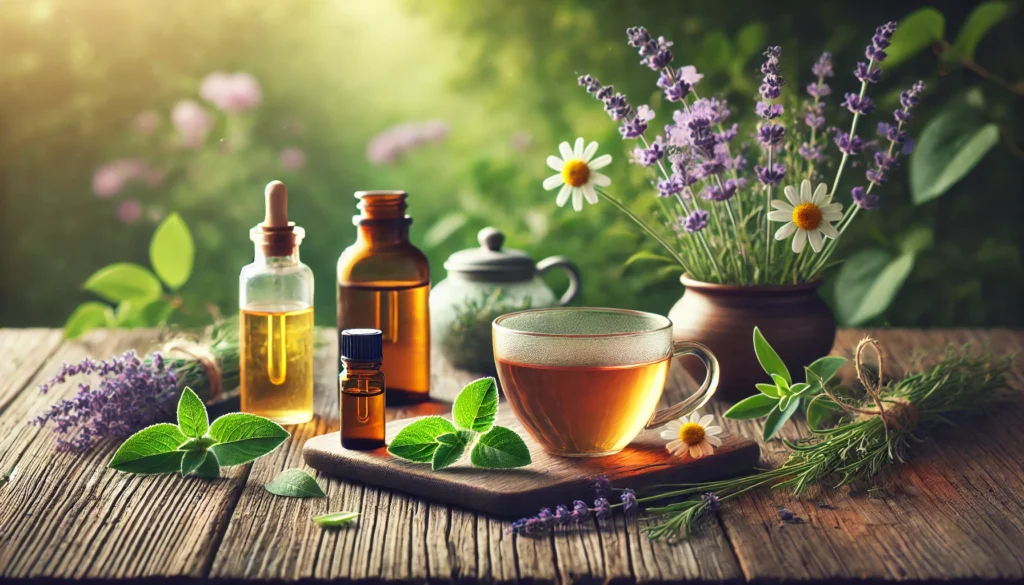In the modern age, where the pace of life often outstrips our capacity to adapt, mental health has taken center stage as a public health priority. More than ever, individuals are seeking integrative approaches to managing anxiety and depression—two of the most prevalent and debilitating mental health conditions in the world. While traditional therapeutic interventions, such as cognitive-behavioral therapy or psychodynamic therapy, remain the cornerstone of mental health treatment, there is a growing curiosity about whether holistic remedies—like herbal supplements, mindfulness practices, and lifestyle modifications—can offer additional benefits. This article explores the nuanced interplay between therapy and natural solutions for mental wellness, investigating whether this combined approach yields greater results than either method in isolation.
You may also like: Best Herbal Alternatives to Anxiolytics: Natural Remedies for Anxiety Relief
Understanding Anxiety and Depression in a Modern Context
Anxiety and depression are complex conditions with overlapping symptoms, including persistent sadness, fatigue, irritability, restlessness, and difficulty concentrating. Yet their causes often diverge, ranging from genetic predispositions and biochemical imbalances to environmental stressors and traumatic life events. As more people grapple with the weight of these conditions, the need for effective, sustainable, and personalized treatment strategies becomes increasingly urgent. Traditional methods of psychotherapy remain highly effective, particularly when tailored to the individual’s specific needs and psychological makeup. However, modern therapeutic paradigms increasingly acknowledge the value of integrative care—combining medical, psychological, and holistic treatments to address the full spectrum of a person’s well-being.
The best therapy for anxiety and depression is often one that considers both mind and body. It involves recognizing that neurotransmitters like serotonin and dopamine are not isolated to the brain; they are influenced by the gut microbiome, the endocrine system, and the immune response. This systems-based understanding underscores the value of holistic interventions that support physiological health as a means of enhancing psychological resilience. In other words, when we ask, “Can therapy help with anxiety?”, we must also consider how lifestyle, nutrition, and herbal remedies play into that answer.

Types of Therapy for Anxiety and Depression: What Works and Why
Psychotherapy, in its various forms, has long been established as a proven intervention for managing both anxiety and depression. Cognitive-behavioral therapy (CBT) is particularly renowned for its structured approach, which helps individuals identify and modify maladaptive thought patterns. The core strength of CBT lies in its emphasis on self-efficacy—empowering individuals to take active roles in reshaping their internal narratives. Numerous studies have confirmed CBT’s efficacy, especially when used consistently over several weeks or months. But CBT is not the only game in town.
Other types of therapy for anxiety include dialectical behavior therapy (DBT), exposure therapy, acceptance and commitment therapy (ACT), and interpersonal therapy (IPT). Each modality offers unique benefits. DBT, for example, focuses on emotional regulation and distress tolerance, making it particularly useful for those with co-occurring conditions such as borderline personality disorder. Exposure therapy helps individuals confront and desensitize themselves to feared stimuli, while ACT encourages people to live in alignment with their values despite psychological pain. When individuals seek counseling for anxiety or depression, choosing the right type of therapy can make a profound difference in outcomes.
Psychodynamic therapy, rooted in Freudian principles, delves into unconscious processes and unresolved conflicts from early life. Though less directive than CBT, it has shown lasting benefits by helping patients understand the roots of their distress. Integrative therapy, which combines elements of various therapeutic modalities, is gaining popularity for its adaptability. These nuanced approaches broaden the definition of what might be considered the best therapy for anxiety disorders, especially when therapy is personalized to the client’s unique psychological and physiological profile.
Does Therapy Help with Anxiety? A Closer Look at the Evidence
The question “does therapy help with anxiety?” is not merely rhetorical; it is one grounded in a significant body of clinical research. Meta-analyses conducted over the last few decades consistently reveal that therapy is not only effective but often transformative for individuals struggling with anxiety disorders. Therapy provides a safe space to explore fears, challenge irrational beliefs, and develop coping strategies. The therapeutic relationship itself can be a source of healing, particularly when trust and empathy are established.
A lesser-known but equally important benefit of therapy is its capacity to normalize emotional experiences. Anxiety, when unmanaged, often leads individuals to feel isolated or defective. Therapy counters this narrative, demonstrating that anxiety is a common, albeit painful, response to stress and uncertainty. The best therapy for anxiety helps clients understand their triggers, establish healthier thought patterns, and regain a sense of agency in their lives. While medications may alleviate symptoms more rapidly, therapy addresses the root causes, providing sustainable, long-term relief.
In recent years, advancements in brain imaging have revealed measurable changes in brain function resulting from successful therapy. These neurological shifts underscore the profound and lasting impact of therapeutic intervention. When combined with holistic strategies—such as adaptogens or lifestyle changes—the neuroplastic benefits of therapy may be further amplified. This reinforces the argument that therapy is not a standalone solution but a powerful component of a comprehensive treatment plan.

Holistic Remedies and Their Role in Mental Health
The surge in popularity of holistic remedies for mental wellness reflects a broader cultural shift toward preventive health and self-empowerment. Many individuals are seeking non-pharmaceutical solutions to complement or, in some cases, replace conventional treatments. Herbal remedies such as ashwagandha, rhodiola rosea, and passionflower have been studied for their anxiolytic and antidepressant properties. These adaptogenic herbs help regulate the body’s stress response by modulating cortisol levels and supporting adrenal function.
Ashwagandha, an ancient Ayurvedic herb, has shown promise in reducing generalized anxiety symptoms and improving resilience to stress. Similarly, rhodiola rosea has been linked to reduced fatigue and improved mood, particularly under conditions of chronic stress. Passionflower, often used in teas and tinctures, exerts a calming effect without the sedative side effects associated with pharmaceuticals. These natural interventions, while not replacements for therapy, can provide supplementary support that enhances emotional stability and cognitive clarity.
Mindfulness-based practices, such as meditation, breathwork, and yoga, have also been shown to influence brain structures associated with attention and emotional regulation. Regular mindfulness practice enhances activity in the prefrontal cortex—the seat of executive functioning—while downregulating the amygdala, which is responsible for fear responses. This neurobiological interplay supports the assertion that natural interventions can complement counseling for anxiety, especially when they cultivate body awareness and emotional regulation.
Nutrition and gut health are increasingly recognized as pivotal to mental wellness. The gut-brain axis, a bidirectional communication pathway between the gastrointestinal tract and the central nervous system, plays a significant role in mood regulation. Probiotic-rich foods, omega-3 fatty acids, and a fiber-rich diet can help support a balanced microbiome, which in turn promotes the synthesis of mood-related neurotransmitters. This systems approach reinforces the need to address both the mind and body in any comprehensive treatment plan.
Pairing Therapy with Holistic Remedies: A Synergistic Approach
The true power of holistic mental wellness may lie in the synergistic integration of traditional therapy and natural remedies. When used in tandem, these approaches can provide multidimensional support that addresses the psychological, physiological, and emotional facets of anxiety and depression. For instance, an individual undergoing CBT for panic attacks may benefit from incorporating adaptogenic herbs that reduce physical symptoms of stress. This dual-action strategy can lead to more rapid and sustained progress.
Clients who pair counseling for anxiety with mindfulness meditation often report heightened self-awareness and greater emotional control. The act of introspection in therapy becomes more impactful when the individual is simultaneously practicing daily meditation, which enhances present-moment awareness. This kind of cross-disciplinary reinforcement allows therapeutic insights to be integrated more deeply into everyday life, reducing the risk of relapse.
Likewise, nutritional interventions can bolster the physiological foundation needed for therapy to succeed. A client struggling with depressive symptoms may find that improving gut health enhances energy levels and cognitive clarity, making them more receptive to therapeutic work. In such cases, the question “will therapy help with anxiety?” becomes less about whether therapy is effective and more about how to optimize the conditions for its success. The combined impact of psychotherapy and anxiety-targeted nutritional strategies exemplifies a holistic model that honors the complexity of human mental health.

Clinical Considerations and Cautions with Holistic Remedies
While the benefits of holistic remedies are compelling, they are not without limitations. Not all natural supplements are safe or effective for every individual, and quality control remains a significant concern in the herbal supplement industry. Before incorporating any new remedy, it is essential to consult a qualified healthcare provider, particularly when these remedies are used alongside conventional medications. Some herbs can interact with antidepressants or anxiolytics, potentially diminishing their efficacy or causing harmful side effects.
Furthermore, holistic remedies should not be viewed as quick fixes or standalone treatments for severe mental health conditions. While they may offer symptom relief and physiological support, they rarely address the underlying cognitive and emotional patterns that contribute to anxiety and depression. This is where psychotherapy and anxiety-focused interventions demonstrate their critical value. A well-structured therapeutic process can guide individuals through deep-seated psychological work, helping them reframe beliefs, process trauma, and build resilience.
It’s also important to differentiate between evidence-based natural remedies and those lacking scientific validation. While the placebo effect can offer temporary relief, long-term improvements are best achieved through interventions supported by clinical research. The best therapy for anxiety and depression is one that incorporates both validated psychological methods and complementary natural approaches vetted for safety and efficacy. Striking this balance requires discernment, professional guidance, and a willingness to engage in a multifaceted healing journey.
Frequently Asked Questions: Therapy and Holistic Support for Mental Wellness
1. How can holistic lifestyle changes make therapy more effective for anxiety and depression?
Holistic lifestyle changes, such as improving diet, sleep, physical activity, and stress management, can significantly enhance the outcomes of therapy for anxiety and depression. These changes support brain health and emotional regulation, creating an internal environment where therapeutic insights are more likely to take root. For example, balanced blood sugar levels and sufficient omega-3 fatty acid intake have been shown to improve mood stability, making it easier for clients to engage fully in therapy sessions. While the best therapy for anxiety works on cognitive and emotional levels, holistic changes work physiologically, setting the stage for sustained progress. This combined approach increases the efficacy of therapy for anxiety and depression by synchronizing mind and body healing processes.
2. Are there emerging trends in therapy that better integrate natural remedies?
Yes, a growing number of therapists are incorporating integrative approaches that acknowledge the benefits of natural remedies and lifestyle-based interventions. Practices such as integrative psychotherapy and functional medicine-informed counseling are bridging the gap between mental health care and holistic wellness. These practitioners may recommend complementary practices—like herbal adaptogens or mindfulness-based stress reduction—alongside evidence-based talk therapy. This model supports a more comprehensive version of counseling for anxiety, recognizing that addressing only cognitive patterns may overlook important biological or environmental contributors. As awareness grows, even traditional clinics are beginning to explore how the best therapy for anxiety disorders can evolve through responsible integration with natural medicine.
3. Can herbal remedies replace therapy for anxiety and depression?
While herbal remedies can provide valuable support, they are not replacements for professional therapeutic care, especially in moderate to severe cases. Supplements such as ashwagandha or passionflower may help regulate the stress response or promote calmness, but they do not address core psychological issues like negative thought patterns, unresolved trauma, or distorted self-concept. Therapy for anxiety and depression is designed to foster cognitive restructuring and emotional processing—areas where herbal remedies have no direct effect. In contrast, psychotherapy and anxiety management programs offer tools that build long-term emotional resilience. A responsible, science-based approach integrates both elements rather than favoring one at the expense of the other.
4. What are some lesser-known types of therapy for anxiety that pair well with holistic practices?
Some lesser-known but promising types of therapy for anxiety include somatic experiencing, ecotherapy, and eye movement desensitization and reprocessing (EMDR). These modalities focus not just on thoughts but on embodied experience and nervous system regulation. Somatic therapies, in particular, align well with holistic practices because they emphasize body awareness, breathing, and tension release—principles also found in yoga, meditation, and breathwork. Ecotherapy, which incorporates nature into the healing process, complements herbal remedies and promotes reconnection with natural rhythms. These approaches expand the possibilities for the best therapy for anxiety by embracing integrative, multi-sensory pathways to healing.
5. How can clients advocate for holistic integration in their mental health treatment plans?
Clients can take proactive steps by discussing their interest in holistic methods openly with their therapist or psychiatrist. It’s helpful to research licensed professionals who specialize in integrative or functional approaches to mental health. These practitioners often recognize the value of combining therapy for anxiety and depression with lifestyle adjustments and natural interventions. Patients can also share specific wellness practices they find effective, such as herbal supplements or breathing exercises, to explore how these might complement their therapy sessions. As more individuals demand personalized care, advocacy becomes a key tool for expanding access to the best therapy for anxiety that honors the mind-body connection.
6. Will therapy help with anxiety that has physical symptoms like fatigue or stomach issues?
Absolutely—therapy can be very helpful for anxiety that manifests through physical symptoms. Chronic anxiety often presents somatically, with fatigue, gastrointestinal distress, muscle tension, and more. Understanding how the mind and body interact is crucial, and many therapists are trained to explore these links. For example, clients may learn how hypervigilant thought patterns contribute to elevated cortisol levels and gut sensitivity. When therapy is complemented by nutritional guidance or adaptogenic herbs, individuals may experience both cognitive relief and a reduction in physical symptoms. Therefore, the best therapy for anxiety acknowledges somatic symptoms as integral to the healing process.
7. How does psychotherapy and anxiety treatment differ when combined with mindfulness practices?
When mindfulness is incorporated into psychotherapy, clients often develop a greater capacity for present-moment awareness, self-regulation, and emotional tolerance. Traditional therapy for anxiety tends to focus on dissecting thought patterns, whereas mindfulness-oriented approaches encourage observing those patterns without immediate judgment or reaction. This shift reduces emotional reactivity and helps build resilience to triggers. Psychotherapy and anxiety-focused mindfulness together provide a dynamic framework where insight and acceptance go hand-in-hand. Clients who engage in both often report reduced rumination and increased emotional agility, enhancing the overall therapeutic effect.
8. Can therapy address the root causes of anxiety if those causes are environmental or nutritional?
Therapy can provide insight and coping strategies for dealing with environmental and nutritional contributors to anxiety, but addressing root causes may require multidisciplinary support. For instance, nutrient deficiencies such as low B-vitamins or magnesium levels can exacerbate anxiety symptoms, as can chronic exposure to noise or social isolation. The best therapy for anxiety disorders recognizes the importance of these external factors and may include psychoeducation or referrals to complementary professionals, such as dietitians or naturopathic doctors. A holistic therapist might work in tandem with other specialists to ensure that therapy for anxiety and depression is rooted in a comprehensive understanding of the client’s life context. This collaborative model reflects the future of mental health care.
9. Is short-term therapy effective for long-standing anxiety conditions?
Short-term therapy, such as solution-focused brief therapy (SFBT) or targeted cognitive interventions, can offer meaningful results—even for chronic anxiety. However, lasting change often requires time, particularly when long-standing anxiety is tied to deep-seated beliefs or unresolved trauma. The goal of therapy for anxiety and depression should be more than symptom relief; it should cultivate lasting self-understanding and psychological flexibility. For some, short-term work acts as a helpful entry point, while others may transition into longer-term psychotherapy. Exploring multiple types of therapy for anxiety may reveal which approaches best match the depth and complexity of an individual’s experience.
10. How can someone evaluate what the best therapy for anxiety looks like for their unique needs?
Determining the best therapy for anxiety is a highly individual process. Factors such as personal preferences, symptom patterns, personality traits, cultural background, and readiness for change all play a role. Some individuals thrive in structured environments like CBT, while others benefit from insight-based approaches or somatic modalities. It’s also important to consider the therapist-client relationship, as rapport is one of the strongest predictors of positive outcomes in therapy. For those managing multiple symptoms, a blend of psychotherapy and anxiety-reducing holistic strategies may offer the most sustainable results. By reflecting on goals, values, and the kind of support needed, individuals can better navigate the landscape of therapy for anxiety and depression.
Psychotherapy and Anxiety: Embracing a Holistic Mental Health Paradigm
Psychotherapy remains an essential pillar in the treatment of anxiety and depression, but it need not exist in isolation. When paired thoughtfully with holistic remedies—ranging from herbal supplements to mindfulness practices—the results can be profoundly transformative. This holistic mental health paradigm recognizes that individuals are complex systems of biology, psychology, and environment. Addressing one dimension while ignoring the others risks incomplete healing.
As we consider the spectrum of treatment options, the phrase “psychotherapy and anxiety” begins to evoke more than just traditional talk therapy. It points toward an integrated approach that values bodywork, nutritional support, nature-based therapies, and mind-body practices. This model does not abandon evidence-based care; rather, it expands it. Clients who engage in therapy while also pursuing complementary strategies report higher satisfaction, reduced symptoms, and greater engagement in their recovery process.
The question “can therapy help with anxiety?” is best answered within this context of integration. Therapy can indeed help—often in profound ways—but its potential is magnified when supported by holistic interventions that align with the individual’s values, lifestyle, and biology. As we deepen our understanding of mental health, the importance of addressing root causes, fostering resilience, and supporting systemic balance becomes increasingly clear.
natural anxiety relief methods, integrative mental health, complementary therapy approaches, emotional wellness strategies, mind-body connection for stress, adaptogenic herbs for stress, mood-boosting supplements, alternative treatments for depression, mental resilience techniques, herbal support for emotional health, gut-brain axis and mood, natural serotonin boosters, Ayurvedic remedies for anxiety, holistic lifestyle for mental wellness, meditation and mental clarity, emotional regulation tools, stress reduction through diet, healing anxiety naturally, therapy and lifestyle changes, plant-based mood enhancers
Further Reading:
Complementary and alternative medicine for the treatment of major depressive disorder
Depression and anxiety: Exercise eases symptoms
Everything You Need to Know About Depression (Major Depressive Disorder)
Disclaimer
The information contained in this article is provided for general informational purposes only and is not intended to serve as medical, legal, or professional advice. While NewsHealthWatch strives to present accurate, up-to-date, and reliable content, no warranty or guarantee, expressed or implied, is made regarding the completeness, accuracy, or adequacy of the information provided. Readers are strongly advised to seek the guidance of a qualified healthcare provider or other relevant professionals before acting on any information contained in this article. NewsHealthWatch, its authors, editors, and contributors expressly disclaim any liability for any damages, losses, or consequences arising directly or indirectly from the use, interpretation, or reliance on any information presented herein. The views and opinions expressed in this article are those of the author(s) and do not necessarily reflect the official policies or positions of NewsHealthWatch.

